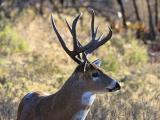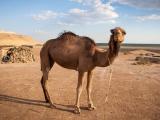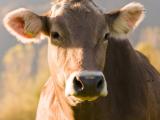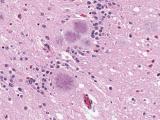Dec 18, 2007 (CIDRAP News) Canadian officials today reported the country's 11th case of bovine spongiform encephalopathy (BSE), or mad cow disease, but said it will not affect Canada's BSE risk status as defined by the World Organization for Animal Health (OIE).
The disease was found in a 13-year-old beef cow from Alberta, the Canadian Food Inspection Agency (CFIA) announced. "The animal's carcass is under CFIA control, and no part of it entered the human food or animal feed systems," the agency said in a news release.
The cow's age means it was born before Canada and the United States banned the use of ruminant animal protein in cattle feed in 1997. Cattle are believed to contract BSE by eating feed containing material from infected animals. People who eat meat from BSE-infected cattle may run a risk of contracting the human equivalent of the brain-wasting diseasevariant Creutzfeldt-Jakob disease.
In recognition of Canada's BSE surveillance and control measures, the OIE classified the country as a "controlled risk" country for BSE in May of this year. "This case will not affect Canada's risk status," the CFIA said.
Canada's latest BSE precaution was to ban the use of cattle-derived "specified risk materials," such as the brain and spinal cord, from animal feeds, pet foods, and fertilizers. The ban took effect Jul 12. US officials have been considering a similar step for more than 2 years. Both countries banned specified risk materials from human food previously.
"The CFIA expects to detect a small number of [BSE] cases over the next 10 years as Canada progresses towards its goal of eliminating the disease from the national cattle herd," the CFIA stated.
The latest case was detected by the national BSE surveillance program, which has discovered all of Canada's cases so far, the agency said. Targeting cattle deemed to have an increased risk of BSE, the program has tested about 190,000 since 2003, when the first case was found.
Canadian officials are working to find the infected cow's herd mates at the time of birth and to determine how it might have been infected, the CFIA said.
The latest BSE case is Canada's third this year. The disease was found in a 6-year-old bull from an Alberta farm in February and in a 5-year-old dairy cow from British Columbia in May.
The United States has had three BSE cases so far: one in Washington state in 2003, one in Texas in 2005, and one in Alabama in 2006. The Washington case was in a Canadian-born cow.
The US Department of Agriculture (USDA) banned the importation of Canadian cattle and beef when Canada's first BSE case surfaced in May 2003. The ban on meat from young (less than 30 months) cattle was lifted soon afterward, but the ban on live cattle continued until July 2005, when young cattle were again admitted. The USDA lifted the ban on older live cattle on Nov 19.
See also:
Jul 13 CIDRAP News story "Canada widens BSE-related feed ban; US still pondering"
Sep 18 CIDRAP News story "US to end BSE-related ban on older Canadian cattle"
Revised USDA rule allowing importation of older Canadian cattle effective Nov 19, 2007















